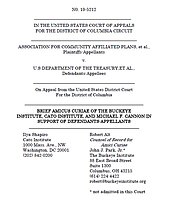The sole exception occurred between December 30, 2016 and 2018, when the Departments limited the maximum term to less than three months. See 81 Fed. Reg. 75,316, 75,317 (Oct. 31, 2016). In 2018, the Departments reversed that limitation and reverted to the prior rule after the President pointed to the term limits on STLDI as one area “where current regulations limit choice and competition” and targeted them for change. 82 Fed. Reg. 48,385 (Oct. 12, 2017).
As the district court observed, “[I]t is not my role to interfere with or disrupt the balance struck by policymakers” in this case. Ass’n for Associated Community Plans v. Dep’t of the Treasury , 392 F. Supp. 3d 22, 45 (D.D.C. 2019). It shouldn’t be the role of this Court either. Limiting the term of STLDI as the Association Appellants desire doesn’t just “limit choice and competition.” It threatens to inflict real harm on real people, as the experience of Arizona resident Jeanne Balvin typifies. As the National Association of Insurance Commissioners explained in 2016, the cramped three-month limit then proposed and later adopted stripped health insurance coverage from consumers after they fell ill, leaving them with a period of up to a year during which they faced expensive medical bills with no health insurance coverage. If the longstanding policy of the 12-month term is once again abandoned in favor of a shorter 3‑month term, the experience of Jeanne Balvin will befall many more sick Americans.

